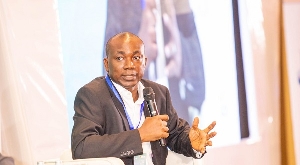A Ghanaian economist and finance professor, has stated that the government’s incessant imposition of taxes is a lazy approach to raising revenue, essentially leaving citizens financially repressed.
Prof Godfred A. Bokpin, strongly criticized the government’s approach to mobilizing revenue through excessive taxation, labelling it as “state-sponsored robbery.”
During an appearance on Newsfile on JoyNews last Saturday, Prof Bokpin, expressed concern that the government’s reliance on imposing new taxes unpredictably is causing financial strain on citizens, leaving them financially repressed.
“This is state-sponsored robbery. This is a robbery that leaves the citizens financially repressed. It should not be accepted. I think in Ghana, we have allowed too many wrongs in this country,” he noted.
According to Prof Bokpin, while generating revenue is essential for the economy, the government’s current strategy is a lazy approach that negatively affects households and hampers the competitiveness of the private sector.
He argued that, imposing more taxes without exploring other optimal ways, is not effective and results in an increased tax burden on citizens.
“Nobody can tell us that the only way out is to impose more taxes and taxes, as we have done. The more we impose taxes, the real effect in scaling up or our tax revenue to GDP ratio is not seen,” he told the host, Samson Lardy Anyenini.
“This is a small open economy. We have more than 27 different tax handles. That is not the only thing. If since 2020 the taxes we have imposed, if you estimate the compliance cost to the taxpayer, it’s huge, configuring systems virtually every six months, there is no predictability,” Prof Bokpin said.
The professor emphasized the need for predictability in tax policies, citing the numerous tax handles and compliance costs that citizens face due to frequent changes. He urged the government to work harder to generate revenue without compromising the well-being of the people and hindering the private sector’s growth.
Prof Bokpin, criticized the disruption caused by frequent changes in tax policies, stating that the current approach is not true taxation. He pointed out the challenges faced by various sectors, such as the banking and manufacturing sectors, in adapting to continuous tax adjustments.
In January 2024, the Ghanaian government directed the Ghana Revenue Authority (GRA) to collaborate with power distribution companies to implement Value Added Tax (VAT) on households exceeding their lifeline power consumption. This move, along with other tax increases, has faced criticism from various quarters, including the Trades Union Congress (TUC), which expressed concerns about the impact on workers’ welfare.
The debate over tax policies in Ghana reflects broader discussions on the balance between revenue generation and the economic well-being of citizens. Critics argue for more thoughtful and strategic approaches to taxation that promote economic growth and protect the interests of individuals and businesses.
“Are we not building it (economy) for Ghanaians? Are we not building it for Ghanaian private-sector businesses? What happens if by the time we achieve macroeconomic stability, half of Ghanaians have gone into poverty and have no way of reversing that? What economy is that? At the centre of it all are people and businesses.”
“The banking sector spends millions of dollars to configure their system to allow the charging of E levy. Check the manufacturing sector, they pay so much and disruption to their production line just to fix their tax stamp or something. Virtually every six months, there’s some level of disruption to planning, and to the production process. My considered view is that what Ghana is doing is not taxation,” he added.
In January 2024, the government requested the Ghana Revenue Authority (GRA) to liaise with the two power distribution companies to transfer Value Added Tax (VAT) generated from consumers who have exceeded their lifeline power consumption.
In a press release, Finance Minister, Ken Ofori-Atta, directed that the Electricity Company of Ghana (ECG) and the Northern Electricity Distribution Company (NEDCO) work with GRA to implement VAT on households that have consumed power above the maximum consumption level specified for block charges for the lifeline unit effective January 1, 2024.
On January 19, the Secretary-General of the Trades Union Congress (TUC), Dr Yaw Baah, said that labour cannot accept the imposition of the 15percent VAT on lifeline electricity consumers as it is inimical to workers’ welfare.
He wondered, how the government thought it wise to further yoke the suffering worker, despite all the hardship, with the new tax.
“This country called Ghana, and all the resources we have, now the government doesn’t see anywhere else to tax; they are taxing our electricity also. Tomorrow they will tax our water, and we are not going to sit down for that to continue. That’s why I’m saying you are going to have a baptism of fire; we need to fight it until this thing is cancelled,” Dr Baah said.
General News of Wednesday, 24 January 2024
Source: theheraldghana.com













